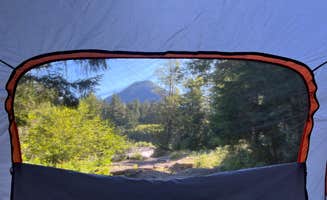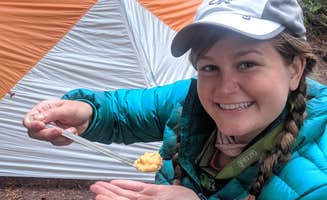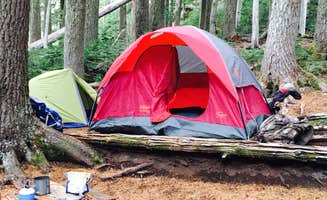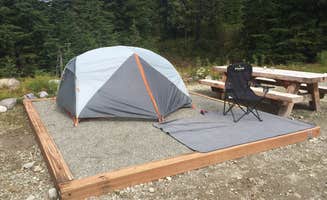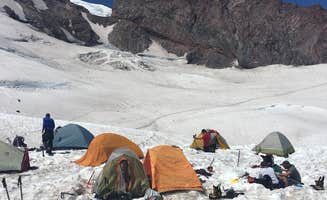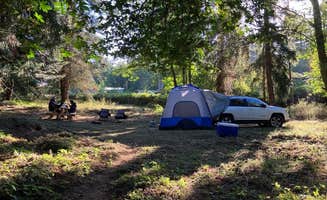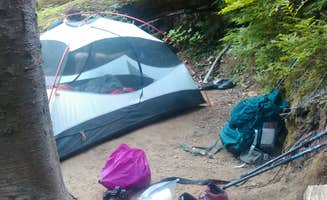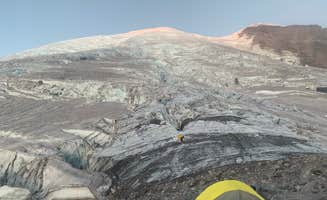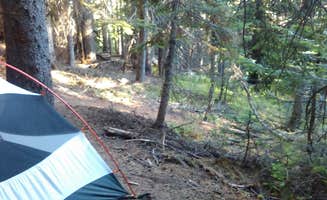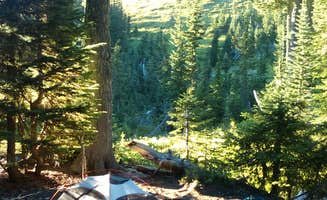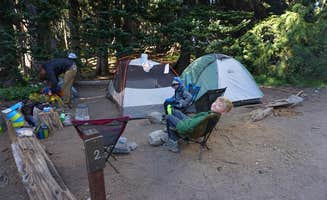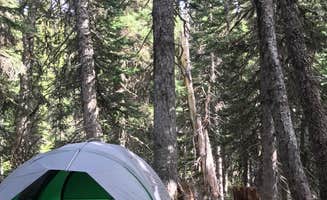Tent camping near Elbe, Washington centers around two main regions: the forested areas surrounding Mount Rainier National Park and the lower elevation sites along the Nisqually River. Most camping spots sit between 1,700-3,000 feet elevation with summer temperatures ranging 45-80°F. Seasonal access varies significantly, with many high-elevation sites only accessible from late June through September due to snow conditions.
What to do
Riverside hiking: Paradise Pines offers easy access to the Nisqually River. "There is also a cool entrance to the river. Which was so peaceful and private! It was wonderful!" notes Kyle G. The location serves as an excellent base for river exploration and photography.
Wildlife viewing: Early mornings at Paradise Pines provide opportunities to spot deer. As one camper reports, "The site was clean, and the wildlife (deer) that wandered through every morning was delightful."
Tolmie Peak Trail: Accessible directly from Mowich Lake Campground, this trail offers alpine views. "We did the Tolmie Peak trail and the trailhead is straight off the campground which is super nice," shares Megan H. The trail features subalpine meadows and mountain views.
What campers like
Seclusion from crowds: Despite proximity to Mount Rainier National Park, NF-52 Dispersed Camping provides quiet alternatives to busy park campgrounds. A camper notes, "We found an awesome walk in spot a little bit earlier on on the forest road before these actual coordinates. While we didn't have the comfort of our car parked right next to us, we had spectacular views of Mt. Rainier, easy access down to the river, and a fire pit."
Bear storage solutions: Eagles Roost Camp offers strategic bear protection. "There are several bear poles around the site, so unless you are in site 7 your food and stinky stuff are close by," explains Kier S., adding practical information for food storage.
Hammock-friendly sites: Some locations offer better tree spacing for hammock campers. According to a review, "If you are hammock camping you are actually a little limited. You could make 1 hammock work at most of the sites, but we had 2 and we were very glad we arrived at an empty campground and had our pick. We chose site 4 and made it work."
What you should know
Access challenges: Roads to high-elevation sites can be difficult. Regarding Mowich Lake Campground, Laura F. warns, "Bit of a rough ride to get up there but totally worth it. There are bears! Although I didn't see one apparently according to our neighbor he walked right behind me."
Temperature variations: Summer nights remain cold at elevation. "Even in July there is snow and temperatures reached as low as 40F. Fortunately we were prepared, but you may not be," shares a camper at Mowich Lake.
Limited camping permits: Ipsut Creek Backcountry Campground requires advance planning. "Be sure to check in with the rangers for a wilderness permit before heading into camp," advises Marley B., highlighting permit requirements for backcountry sites.
Tips for camping with families
Private settings for kids: Some sites offer better family privacy. "Our family loves staying in private camp sites. With little kids you really can't beat it! Paradise Pines was exactly what we were looking for. It's quiet and private while being so close to Rainier!" shares Dara M.
Multiple tent pads for larger groups: White River Dispersed Camping accommodates family setups. "Each site is pretty small…maybe enough for 2-3 tents," notes Jada P., providing guidance on space limitations.
Beginner-friendly backcountry option: Ipsut Creek offers accessible wilderness. "The road into camp is easy, either by foot or bicycle. The road slowly meanders uphill alongside the Carbon River for 5 miles, giving campers majestic views of Mount Rainier and surrounding peaks," explains a camper, describing an option suitable for families with older children.
Tips from RVers
Site selection for larger vehicles: Most dispersed areas have limited space. Regarding NF-52, Eric V. cautions, "I don't know where on 52 people are finding sites with views, but we drove the entire length of it and didn't see one spot worth stopping at. I suppose if you don't mind sleeping five feet from a busy paved road, fine, but these sites are mostly glorified gravel shoulders."
Ground clearance requirements: Cougar Rock Group Campground offers better accessibility than dispersed sites. "Well maintained national park campground. Reserve on Recreation.gov. Sites have tables, bear boxes and fire pits," notes marcus K., contrasting with rougher forest roads.
Seasonal road conditions: Forest service roads deteriorate after winter. A camper advises, "4x4 / high clearance vehicles recommended - saw some subarus trying to navigate into a cleared area and it was pretty scrape-y," highlighting vehicle requirements for accessing remote tent camping areas around Elbe.


